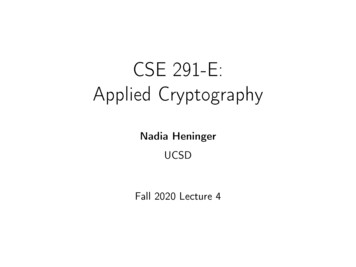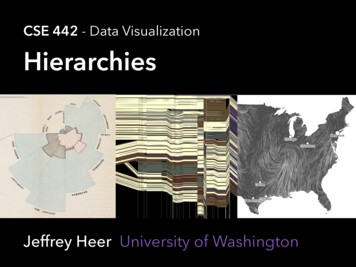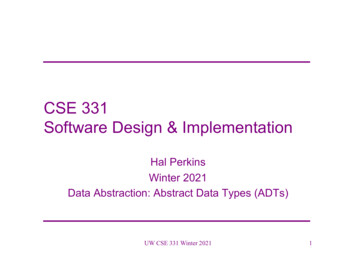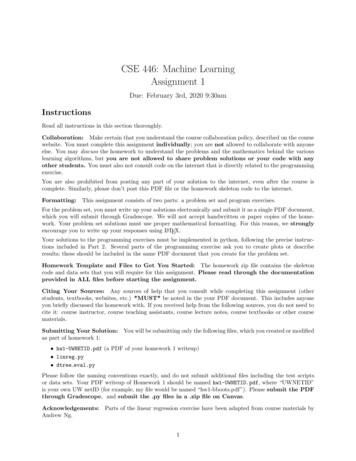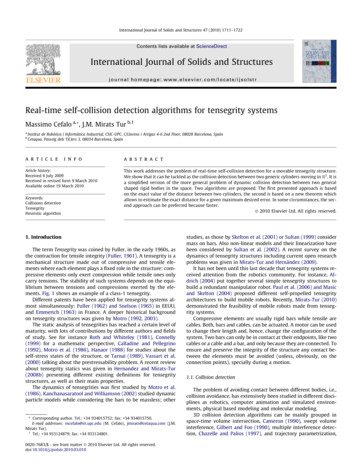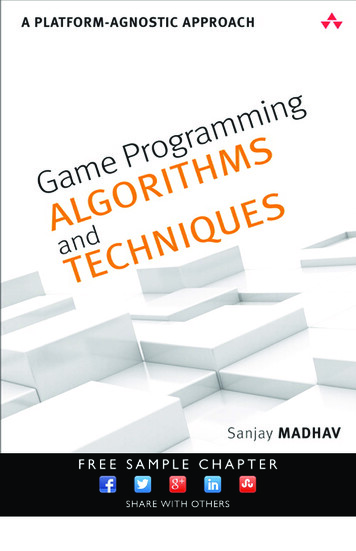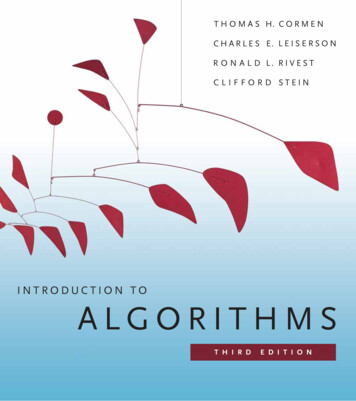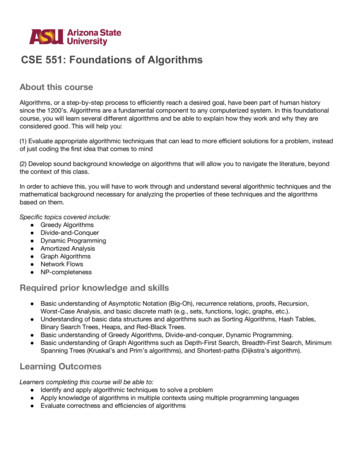
Transcription
CSE 551: Foundations of AlgorithmsAbout this courseAlgorithms, or a step-by-step process to efficiently reach a desired goal, have been part of human historysince the 1200’s. Algorithms are a fundamental component to any computerized system. In this foundationalcourse, you will learn several different algorithms and be able to explain how they work and why they areconsidered good. This will help you:(1) Evaluate appropriate algorithmic techniques that can lead to more efficient solutions for a problem, insteadof just coding the first idea that comes to mind(2) Develop sound background knowledge on algorithms that will allow you to navigate the literature, beyondthe context of this class.In order to achieve this, you will have to work through and understand several algorithmic techniques and themathematical background necessary for analyzing the properties of these techniques and the algorithmsbased on them.Specific topics covered include: Greedy Algorithms Divide-and-Conquer Dynamic Programming Amortized Analysis Graph Algorithms Network Flows NP-completenessRequired prior knowledge and skills Basic understanding of Asymptotic Notation (Big-Oh), recurrence relations, proofs, Recursion,Worst-Case Analysis, and basic discrete math (e.g., sets, functions, logic, graphs, etc.).Understanding of basic data structures and algorithms such as Sorting Algorithms, Hash Tables,Binary Search Trees, Heaps, and Red-Black Trees.Basic understanding of Greedy Algorithms, Divide-and-conquer, Dynamic Programming.Basic understanding of Graph Algorithms such as Depth-First Search, Breadth-First Search, MinimumSpanning Trees (Kruskal’s and Prim’s algorithms), and Shortest-paths (Dijkstra’s algorithm).Learning OutcomesLearners completing this course will be able to: Identify and apply algorithmic techniques to solve a problem Apply knowledge of algorithms in multiple contexts using multiple programming languages Evaluate correctness and efficiencies of algorithms
Estimated Workload/Time Commitment Per Week18 - 20 hours per weekCreatorProfessor Andréa RichaAndréa Richa joined Arizona State University (ASU) in 1998. She is currently affiliated with the BiomimicryCenter at ASU, and the Biosocial Complexity Initiative in general. Prof. Richa’s main areas of expertise are indistributed/network algorithms and computing in general. More recently she has focused on developing thealgorithmic foundations on what has been coined as programmable matter, through her work on selforganizing particle systems (SOPS) (see sops.engineering.asu.edu ). Her work has been widely cited, andincludes, besides SOPS, work on bio-inspired distributed algorithms, distributed load balancing, packetrouting, wireless network modeling and topology control, wireless jamming, data mule networks, underwateroptical networking, and distributed hash tables (DHTs). Dr. Richa received the 2017 Best Senior Researcheraward from the School of Computing, Informatics, and Decision Systems Engineering (CIDSE). She was therecipient of an NSF CAREER Award in 1999, an Associate Editor of IEEE Transactions on Mobile Computing,and the keynote speaker and program\general chair of several prestigious conferences. In particular, Prof.Richa was the Program Committee Chair of the 31st International Symposium on Distributed Computing(DISC), 2017, one of the top two conferences in distributed computing. Prof. Richa has also delivered severalinvited talks both nationally and internationally. For a selected list of her publications and otheraccomplishments, CV, and current research projects, please visit www.public.asu. edu/ aricha orsops.engineering.asu.edu.
CSE 579: Knowledge Representation and ReasoningAbout this courseKnowledge representation and reasoning (KRR) is one of the fundamental areas in Artificial Intelligence. It isconcerned with how knowledge can be represented in formal languages and manipulated in an automatedway so that computers can make intelligent decisions based on the encoded knowledge. KRR techniques arekey drivers of innovation in computer science, and they have led to significant advances in practicalapplications in a wide range of areas from Artificial Intelligence to Software Engineering. In recent years, KRRhas also derived challenges from new and emerging fields including the semantic web, computational biology,and the development of software agents. This is a graduate-level course that introduces fundamentalconcepts as well as surveys recent research and developments in the field of knowledge representation andreasoning.Specific topics covered include: Classical logic and knowledge representation Answer set programming Reasoning about actions and planning Ontology, Semantic Web languages, and knowledge graph Combining logic and probabilityRequired prior knowledge and skills ProgrammingClassical logicStatisticsAlgebraLearning OutcomesLearners completing this course will be able to: Discuss the foundations of KRR Explain different categories of representation and reasoning tasks Assess the tradeoff between representation and reasoning Identify which knowledge-based techniques are appropriate for which tasks Apply KRR systems to challenging real-world problemsEstimated Workload/Time Commitment Per Week15 - 20 hours per week
Technology RequirementsHardware - StandardSoftware and Other (programs, platforms, services, etc.) - Clingo, protégéCreatorJoohyung LeeJoohyung Lee is a tenured associate professor in the School of Computing, Informatics and Decision SystemsEngineering at ASU, where he has led the Automated Reasoning Group since 2005. He is interested indesigning and building intelligent systems, which can perform automated reasoning based on the knowledgerepresented in a formal language, thereby intelligently handling open-ended tasks by "thinking." He has beenworking on knowledge representation, logic programming, commonsense reasoning, reasoning underuncertainty, cognitive robotics, computational logics, security, and question answering. His research has beensupported by the National Science Foundation, Department of Defense, IARPA, Siemens, Bosch, and ETRI.He is a recipient of Outstanding Paper Honorable Mention Award from AAAI 2004. He received his Ph.D fromthe University of Texas at Austin.
CSE 531: Distributed and Multiprocessor Operating SystemsAbout this courseThis course will teach both the fundamental concepts and principles of distributed systems and the practicalskills for developing distributed systems. Specific topics covered include distributed systems architecture,communication, coordination, and consistency and replication.Specific topics covered include: ArchitectureCommunicationCoordinationConsistency and ReplicationRequired prior knowledge and skills A strong understanding of computer organization, operating systems, and computer networksProficiency in C and Java programmingLearning OutcomesLearners completing this course will be able to: Apply the fundamental concepts and principles to analyze distributed and multiprocessor operatingsystems. Utilize the basic approaches and techniques to develop distributed and multiprocessor operatingsystems.Estimated Workload/Time Commitment Per Week15 - 20 hours per weekTechnology RequirementsHardware - Standard hardware with major OSSoftware and Other (programs, platforms, services, etc.) - To complete course projects, some of the followingsoftware may be required:
Virtual machinesLinuxgRPCPythonCreatorsMing Zhao, Ph.D.Ming Zhao, Ph.D. is an associate professor at Arizona State University in the School of Computing, Informatics, andDecision Systems Engineering (CIDSE). Before joining ASU, he was an associate professor of the School ofComputing and Information Sciences (SCIS) at Florida International University. He directs the Research Laboratoryfor Virtualized Infrastructure, Systems, and Applications (VISA). His research interests are in distributed/cloudcomputing, big data, high-performance computing, autonomic computing, virtualization, storage systems andoperating systems.
CSE 535: Mobile ComputingAbout this courseThe goal of this course is to provide an in-depth understanding of the fundamental concepts and challenges inthe area of mobile computing and study the existing and proposed solutions for these challenges from both aresearch and development perspective. Several topics, including mobile app development, wirelesscommunication, mobile technology management, mobility tracking, context awareness, and programmingapplications on mobile systems, will be covered in this course. Course work will involve programmingassignments, discussions, quizzes, and a project.Specific topics covered include: Mobile programming Internet of Things (IoT) Edge and cloud computing Mobile networking Mobile information access Adaptive applications enabled by machine learning and AI Energy-aware systems Location-aware computing Mobile security and privacyRequired prior knowledge and skills NetworkingOperating ning OutcomesLearners completing this course will be able to: Design a context-aware application. Identify the advantages of using context in applications. Explore the challenges arising due to changes in the environment in which computation is performed. Identify relevant environment changes and analyze their causes, such as mobility, availability of data,and resource constraints. Define smartness and identify salient features that distinguish smart applications from traditional onesin the context of smart city, smart grid, smart transportation, smart mobile applications, andautonomous systems, such as autonomous cars. Describe key features of Internet of Things (IoT) and design a distributed smart application using IoT. Define cloud computing, crowdsourcing, volunteer computing, and other novel variants of pervasive
computing.Analyze nonfunctional requirements of smart mobile applications, such as safety security sustainability.Apply popular tools, such as machine learning, security protocols, AI, and software testing, to validatesafety security and sustainability of smart mobile applications.Acquire programming skills on popular mobile platforms, such as Android.Develop, end-to-end, a sensor-enabled smart autonomous practical application.Estimated Workload/Time Commitment Per Week15 - 20 hours per weekTechnology RequirementsHardware Memory: At least 2GB RAM (4GB RAM recommended) Processor: At least 1GHz (2GHz or more recommended) Operating System: Windows 7 or higher / OS X v10.7 or higherSoftware and Other (programs, platforms, services, etc.) Android Studio Integrated Development Environment (IDE) with the software development kit (SDK)bundle (check the system requires for Android Studio on their website) You can utilize either MatLab or Python for the programming assignmentsCreatorsDr. Ayan BanerjeeDr. Banerjee is an Assistant Research Professor at the School of Computing Informatics and DecisionSystems Engineering, Arizona State University. His research interests include pervasive computing inhealthcare and analysis, safety verification of embedded system software. Dr. Banerjee currently focuses ondata driven analysis and modeling in many different domains including diet monitoring, gesture recognition,
and biological process modeling. He works closely with government agencies such as Food and DrugAdministration and medical agencies such as Mayo Clinic. Dr. Banerjee is also interested in hybridsystem-based modeling and safety verification of closed loop control systems which interact with the physicalenvironment, also known as Cyber-Physical Systems. In addition, his work includes developing managementalgorithms for sustainable data centers using renewable sources of energy.
CSE 539: Applied CryptographyAbout this courseCryptography provides the underlying security methods for the web and many other computer applications.This course covers the design usage of cryptographic protocols for online and offline computing applications.Assuring the quality, validity and privacy of information is one of the key applications of Cryptography.Applications of cryptography ranges from signatures and certificates to trustless multiparty computations.Specific topics covered include: Large numbers, random numbers, hash functions and number theory Encryption methods and common ciphers Password storage and password cracking Authentication, key exchange and man in the middle (MITM) attacks Secure messaging, Kerberos and Secure Sockets Layer (SSL) or Transport Level Security (TLS) RSA and why it works Advanced cryptographic protocols Anonymity, money and secure election algorithmsRequired prior knowledge and skills AlgorithmsData StructuresComputer OrganizationOperating SystemsProgramming using C or C using Linux (Python or Java is useful)Learning OutcomesLearners completing this course will be able to: Differentiate the major algorithmic techniques used in cryptography Explain the concept and correctness of cryptographic protocols Perform identification of vulnerabilities in systems Explain the algorithms used for constructing cryptographic computations Perform steps needed for encryption, authentication, integrity, certification and data privacy Explain complex protocols that involve many steps and computing agents who do not trust each otherEstimated Workload/Time Commitment Per Week15 - 20 hours per week
Technology RequirementsHardware - Standard with major OSSoftware and Other (programs, platforms, services, etc.) - Virtual Machine running 32 bit LinuxCreatorDr. Partha DasguptaDr. Partha Dasgupta is an Associate Professor in the School of Computing, Informatics, and DecisionSystems Engineering at Arizona State University (ASU). His core areas of expertise are in Computer Security,Cryptography and Operating Systems. His current research focus is the use of cryptography and securesoftware systems to provide security and dependability of consumer computing. He has significant priorresearch results and publications in construction of distributed operating systems, high performance systemsand secure computing infrastructures. In addition to ASU, Dr. Dasgupta has held faculty positions at GeorgiaTech and New York University.
CSE 543: Information Assurance and SecurityAbout this courseThis course will provide basic and comprehensive understanding of the problems of information assurance (IA)and security, possible solutions to these problems, especially the security of information on computers andnetworks. This course will focus on the IA technology as well as IA policy, management, legal and ethicalissues.Specific topics covered include: IA Basics: Overview, security and privacy principles and strategies, mission assurance, physical andpersonal security, formal methods; contingency and disaster recovery planning.IA Management: IA policies, certification and accreditation, authentication protocols and accesscontrol, administrative security controls; risk analysis and management.IA in Information System and Application Development: IA in outsourcing, open-source software,health-care, service-based and cloud computing.IA and Social Aspects: Laws and regulations related to IA and security, legal and ethical issues; IA insocial media.Required prior knowledge and skills Knowledge of information systems, computer networks and their operationsLearning OutcomesLearners completing this course will be able to: Have basic and comprehensive understanding of the problems of information assurance (IA) andsecurity Understand possible solutions to these problems, especially the security of information on computersand networksEstimated Workload/Time Commitment Per Week15 - 20 hours per week
CreatorsStephen S. Yau, Ph.D.Professor Stephen S. Yau joined ASU in 1994. He is a professor in the School of Computing, Informatics, andDecisions Systems Engineering (CIDSE). Formerly, he was a professor and chair of the Department ofComputer and Information Sciences at the University of Florida from 1988 to 1994. In 1961, he joined thefaculty of Northwestern University in Evanston, Illinois, and later became the Walter P. Murphy Professor andChair of the Department of Electrical Engineering and Computer Science. He has published more than 210journal and conference papers and his research has been supported by NSF, AFRL, ONR, ARO, NIH andcompanies including Hitachi and Fujitsu.
CSE 545: Software SecurityAbout this courseThis course will provide students with an understanding of the theories, tools, and techniques to identify,exploit, and mitigate software security vulnerabilities in the network, binary, and web levels. Students will study,in-depth, vulnerability classes to understand how to protect software and how to secure software.We will also cover the history of software security, and ethical considerations. This course will focus on ahands-on approach: In addition to understanding vulnerability classes, students will be required to identify andexploit vulnerabilities.Specific topics covered include: History of Software SecuritySoftware Security EthicsNetwork SecurityApplication SecurityWeb SecurityTechnologies covered include: Cx86-64 AssemblyHTTPHTMLJavaScriptSQLScripting languagesRequired prior knowledge and skills This course will be very challenging, and students are expected to learn the necessary technologies ontheir own time.C/C ProgrammingScripting language programming (Something similar to Python, Ruby, or PHP)Computer Networking Specifically Ethernet, ARP, Routing, IP Addresses, Fragmentation, ICMP, UDP, and TCPCompilers Linkers ELFOperating Systems
Computer Architecture Specifically x86-64 assembly System callsLearning OutcomesLearners completing this course will be able to: Explain the history of security vulnerabilities.Differentiate between ethical and unethical behavior in regards to identifying and exploiting securityvulnerabilities.Demonstrate local network-level security attacks.Evaluate a local networking situation to determine appropriate attacks and the corresponding defenses.Analyze a binary application, describe its behavior, identify security vulnerabilities, and develop anexploit.Analyze a web application, understand its behavior, identify security vulnerabilities, and develop anexploit.Estimated Workload/Time Commitment Per Week15 - 20 hours per weekTechnology RequirementsHardware - ComputerSoftware and Other (programs, platforms, services, etc.) Linux Operating System Possibly running in Virtual Machine SSH Client (Putty for Windows)
CreatorAdam Doupé, Ph.D.Dr. Adam Doupé is an Assistant Professor in the School of Computing, Informatics, and Decision SystemsEngineering at Arizona State University and is the Associate Director of the Center for Cybersecurity and DigitalForensics in the Global Security Initiate at Arizona State University. Dr. Doupé was awarded the Top 5%Faculty Teaching Award for the Fulton Schools of Engineering at ASU for 2016, the Fulton Schools ofEngineering Best Teacher Award in 2017 and 2018, the Fulton Schools of Engineering Outstanding AssistantProfessor Award in 2017, and the NSF CAREER award in 2017. Dr. Doupé has co-authored over 30peer-reviewed scholarly publications and served on program committees of well-known international securityconferences. As a founding member of the Order of the Overflow, Dr. Doupé has organized the DEF CONCapture The Flag competition since 2018.
CSE 548: Advanced Computer and Network SecurityAbout this courseFocusing on the areas of applied cryptography, system security, and the principles and practices of networksecurity, this course explores the necessary tools, techniques, and concepts of network security for moderncomputer networks. The course’s coverage of advanced network security includes both cutting-edgetechnologies and research topics, primarily at the MAC layer and above. The course not only provides studentswith exposure to burgeoning areas of network security but also hands-on experience using the tools essentialfor computer network and cybersecurity today and in the future.Specific topics covered include: Public key and symmetric key based cryptographyAccess control modelsNetwork security policiesAuthentication protocolsSecure protocol standardsPublic Key Infrastructure and its development trendsVirtual Private Network and its restrictionsAttack graphs and attack treesSDN/NFV based Security SolutionsCloud network securityML and AI for computer network securityMoving target defense in computer networksKey management (Public key, shared key, group key, distributed key management)Required prior knowledge and skills Knowledge: Basic computer network concepts such as TCP/IP, packet switching, network servicesarchitecture, network protocol stack (MAC layer and above), and basic network security concepts suchas encryption/decryption, authentication, access control, identity/key managementSkills: Java, Python, C/C , HTML programmingLearning OutcomesLearners completing this course will be able to: Explain basic security terminologies, models, architectures, and techniques.Apply proven methodologies to design secure networks that address enduring and emerging issues.Apply network security standards and cryptography algorithms.
Document the process of designing and implementing secure networking systems.Build a secure networking system to counter given network attacks.Adhere to standards of computer security ethics.Manage a network security establishment effort.Assess networking systems to identify security vulnerabilities.Represent security system setup and process results in written form.Discuss cutting-edge network security research and development.CreatorDijiang HuangDr. Dijiang Huang is an associate professor in the School of Computing Informatics and Decision SystemsEngineering. He teaches Computer Network and Security (CSE468) at the undergraduate level and AdvancedComputer Network and Security (CSE548) at the graduate levels. In addition, he had taught computer sciencecourses such as Computer Networks (CSE434), Cloud Computing (CSE 546), Concepts of Computer Scienceand Data Structure (CSE 205), Data Structures and Algorithm (CSE 310), and Introduction to ComputerScience and Engineering (CSE 101) at Arizona State University. Dr. Huang received his Bachelor of Sciencedegree in Telecommunications from Beijing University of Posts & Telecommunications, China, and hisComputer Science and Telecommunications Master of Science degree and Ph.D. from the University ofMissouri-Kansas City.Dr. Huang's research interests are in computer and network security, mobile ad hoc networks, networkvirtualization, and mobile cloud computing. His research is supported by the federal agencies NSF, ONR, ARO,and NATO, and organizations such as Consortium of Embedded System (CES), Kern Family Foundation,Hewlett-Packard, and China Mobile. He is a recipient of ONR Young Investigator Award and HP InnovationResearch Program (IRP) Award, a Distinguished Lecturer of IEEE ComSoc, and a co-founder of AthenaNetwork Solutions LLC (ATHENETS) and CyNET LLC. He currently leads the Secure Networking andComputing (SNAC) research group at ASU.
CSE 565: Software Verification, Validation, and TestingAbout this courseSoftware as a stand alone product or embedded within a system plays an integral role in our world today. Asa consequence, it is essential that software works as expected. This requires software testing which entailsanswering both the verification question: “Are we building the product right?” and the validation question:“Are we building the right product?”. Understanding these questions is crucial for developing good test cases.This course is for anyone involved in testing software at any level starting from code modules to systemtesting. Strategies and techniques are presented for both testing software as well as planning and trackingtesting efforts.Specific topics covered include: Testing backgroundTesting process activitiesRequirements based testing techniques Structure based testing techniques System testingTesting toolsReliability models Statistical testingTest planningTracking testing progress Test documentationTest process improvementRequired prior knowledge and skills High-level programming languageSoftware development life cycle modelsLearning OutcomesLearners completing this course will be able to: Explain how testing activities fit within leading software development process models Understand andapply best practices for software testing Create test cases based on commonly used requirements based testing techniques Create test casesto achieve control and data flow structure based coverage Apply static analysis techniques to identify code anomalies Create test cases that demonstrate system-level quality requirements are being met Identifyappropriate testing tools for applications Predict software reliability based on operational profile testing and reliability models Describe activitiesto perform for improving testing processes Analyze testing needs to create a plan to achieve test objectives Track testing progress against a plan
Estimated Workload/Time Commitment Per Week15 - 20 hours per weekCreatorDr. James CollofelloJames Collofello serves as Vice Dean of Academic and Student Affairs and has held this position since 2006.In this capacity he leads the school’s student recruitment and retention, career development and placement,K-12 programming, new curriculum development, accreditation and oversight of Fulton Differenceprogramming. The Fulton Difference consists of innovative programs operated at scale to provide studentswith opportunities to develop and enhance their research, leadership, project development andentrepreneurship skills. Major Fulton Difference programs include engineering student organizations, FultonUndergraduate Research Initiative, Grand Challenge Scholars Program, Undergraduate Teaching AssistantProgram and Engineering Projects in Community Service. He is also a professor of computer science andsoftware engineering. His teaching and research interests lie in the software engineering area with anemphasis on software quality assurance, software process improvement and software project management.He has also been active in developing and improving computer science curriculum and working to improveundergraduate retention. In addition to his academic activities, he has also been involved in applied researchprojects, training and consulting with many large corporations over the last 25 years.
CSE 511: Data Processing at ScaleAbout this courseDatabase systems are used to provide convenient access to disk-resident data through efficient queryprocessing, indexing structures, concurrency control, and recovery. This course delves into new frameworksfor processing and generating large-scale datasets with parallel and distributed algorithms, covering thedesign, deployment and use of state-of-the-art data processing systems, which provide scalable access todata.Specific topics covered include: Efficient query processing Indexing structures Distributed database design Parallel query execution Concurrency control in distributed parallel database systems Data management in cloud computing environments Data management in Map/Reduce-based NoSQL database systemsRequired prior knowledge and skills Basic statistics and computer science knowledge including computer organization and architecture,discrete mathematics, data structures, and algorithmsKnowledge of high-level programming languages (e.g., C , Java) and scripting language (e.g., Python)Learning OutcomesLearners completing this course will be able to: Differentiate among major data models such as relational, spatial, and NoSQL Perform queries (e.g., SQL) and analytics tasks in state-of-the-art database systems Apply leading-edge techniques to design/tune distributed and parallel database systems Utilize existing NoSQL database systems as appropriate for specified cases Perform database operations (e.g., selection, projection, join, and groupby) in state-of-the-art clustercomputing systems such as Hadoop/Spark Perform scalable data processing operations (e.g., selection, projection, join, and groupby) in cloudcomputing environments, including Amazon AWSEstimated Workload/Time Commitment Per Week15 - 20 hours per weekTechnology Requirements
Hardware - Standard hardware with major OSSoftware and Other (programs, platforms, services, etc.) - Tocomplete course projects, some of the following may be required: Amazon AWS, Cloud, Hadoop/Spark,GitHub, PostgreSQL, MongoDB, Neo4j.CreatorsDr. Mohamed SarwatMohamed Sarwat is an Assistant Professor of Computer Science and the director of the Data Systems(DataSys) lab at Arizona State University (ASU). He is also an affiliate member of the Center for Assured andScalable Data Engineering (CASCADE). Before joining ASU, Mohamed obtained his MSc and PhD degrees incomputer science from the University of Minnesota. His research interest lies in the broad area of datamanagement systems.
Dr. Ming ZhaoMing Zhao is an associate professor of the ASU School of Computing, Informatics, and Decision SystemsEngineering. Before joining ASU, he was an associate professor of the School of Computing and InformationSciences (SCIS) at Florida International University. He directs the Research Laboratory for VirtualizedInfrastructure, Systems, and Applications (VISA). His research interests are in distributed/cloud computing, bigdata, high-performance computing, autonomic computing, virtualization, storage systems and operatingsystems.
CSE 539: Applied CryptographyAbout this courseCryptography provides the underlying security methods for the web and many other computer applications.Th
CSE 551: Foundations of Algorithms About this course A l g o ri t h ms, o r a st ep - b y- st ep p ro cess t



